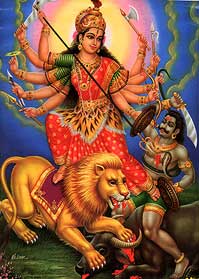- Jan 19, 2014
- 438
- 874
Bhagoutee from the word Bhagawati, which is one of the names for the Hindu goddess Shakti.
Shakti is the agent of creation and change in the Universe. It is the source of power.
Its parallel concept in Gurbani is Hukam (Divine Command). According to the Hukam, all things come to pass in the Universe.
In my opinion, this is a beautiful way of marrying the Muslim concept of Allah's Will (Hukam, from Arabic) with the Hindu concept of Shakti. There is only one elephant, i.e. God, which blind mice see from their own perspectives. They are describing the same thing, which is why Guru ji found favor among both Muslims and Hindus.
Guru Gobind Singh ji poetically represents Hukam with the sword, which he refers to as Bhagoutee. The sword was the source of power and the agent of change in Guru ji's time, hence the reason he led his Sikhs to take up arms against tyranny.
The following is a copy of the Mool Mantar attributed to Guru Gobind Singh ji. Notice the sword (Bhagoutee) drawn above the Onkar.

From Gurbani, we know the Onkar to be the Akhar (word) uttered by the Divine as the Shabad / Kavaao (utterance). This utterance is the original Hukam (command) through which all creation manifests, changes, and will eventually disappear.
Poetically the sword (Hukam) also represents the Guru's Matt (wisdom). This wisdom is imparted to us by the Shabadh (Divine Utterance) through which the Hukam transpires. Gurbani states that one who understands Hukam does not speak in Haumai (I am). In other words, one who is attuned to the Shabadh does not view himself / herself as a distinct entity. He or she is part and parcel of the Universe itself.
Related topic - Spn Project: Ardaas In Focus
Shakti is the agent of creation and change in the Universe. It is the source of power.
Its parallel concept in Gurbani is Hukam (Divine Command). According to the Hukam, all things come to pass in the Universe.
In my opinion, this is a beautiful way of marrying the Muslim concept of Allah's Will (Hukam, from Arabic) with the Hindu concept of Shakti. There is only one elephant, i.e. God, which blind mice see from their own perspectives. They are describing the same thing, which is why Guru ji found favor among both Muslims and Hindus.
Guru Gobind Singh ji poetically represents Hukam with the sword, which he refers to as Bhagoutee. The sword was the source of power and the agent of change in Guru ji's time, hence the reason he led his Sikhs to take up arms against tyranny.
The following is a copy of the Mool Mantar attributed to Guru Gobind Singh ji. Notice the sword (Bhagoutee) drawn above the Onkar.

From Gurbani, we know the Onkar to be the Akhar (word) uttered by the Divine as the Shabad / Kavaao (utterance). This utterance is the original Hukam (command) through which all creation manifests, changes, and will eventually disappear.
Poetically the sword (Hukam) also represents the Guru's Matt (wisdom). This wisdom is imparted to us by the Shabadh (Divine Utterance) through which the Hukam transpires. Gurbani states that one who understands Hukam does not speak in Haumai (I am). In other words, one who is attuned to the Shabadh does not view himself / herself as a distinct entity. He or she is part and parcel of the Universe itself.
Related topic - Spn Project: Ardaas In Focus
Last edited:



